There are literally hundreds of words in the English language that sound or look similar to their Italian equivalents. This is because English has been heavily influenced by Latinate and Romance sources, such as French and Anglo-Norman, ever since the Early Middle Ages.
In this article, I’m not going to be investigating Italian-sounding words that arrived through French or Latin. If I did, I’d be writing about almost 60% of today’s modern English vocabulary! Rather, I plan to focus on 50 common Italian words in English that arrived directly through Italian and, for the most part, still resemble Italian in terms of their pronunciation and spelling.
Iniziamo! Let’s begin! 🙂
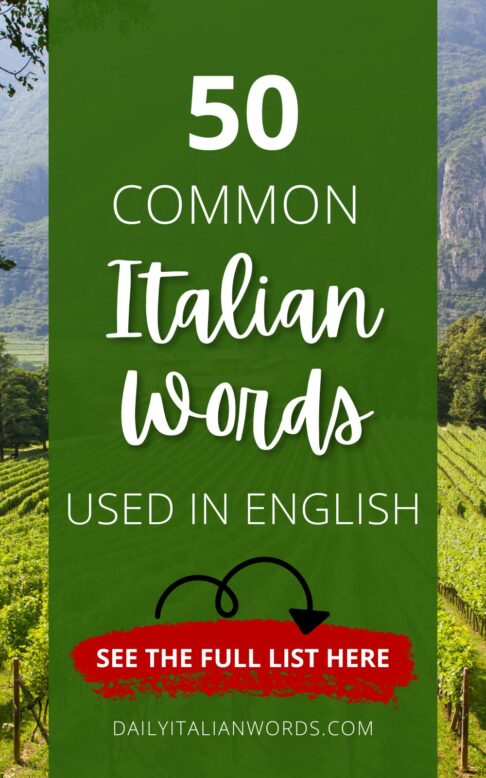
Common Italian Words Used in English
1. Volcano
Entered English in the 17th century from Italian.
English meaning: a mountain or hill with a crater or vent through which lava, rock fragments, hot vapour, and gas erupt from the earth’s crust
- Plural: volcanoes or volcanos
Italian meaning: spelled vulcano; identical to the English meaning
- Plural: vulcani

2. Lava
Entered English in the 18th century from the Neapolitan dialect. Refers to lava stream from Vesuvius.
English meaning: hot molten rock erupted from a volcano
- Plural: lavas
Italian meaning: identical to the English meaning
- Plural: lave

3. Influenza
Entered English in the 18th century after an influenza epidemic broke out in Italy.
English meaning: a contagious viral infection of the respiratory passages, often abbreviated to flu
- Plural: influenzas
Italian meaning: literally influence but can also refer to the respiratory infection
- Plural: influenze

4. Fiasco
Entered English in the 19th century.
English meaning: a complete failure
- Plural: fiascos
Italian meaning: to fail in a performance (figurative), a bottle or flask (literal)
- Plural: fiaschi

5. Finale
Entered English in the mid-18th century.
English meaning: the last part of a piece of music or event
- Plural: finales
Italian meaning: identical to the English meaning but it can also mean final, end, conclusive (ex. il capitolo finale = the final chapter)
- Plural: finali
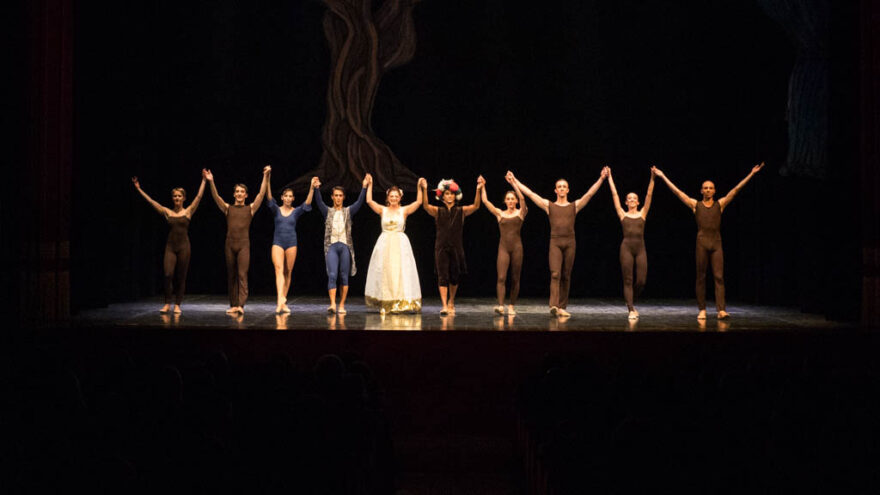
6. Scenario
Entered English in the late 19th century.
English meaning: a written outline of the plot and scenes of a novel, film or stage work; a postulated sequence of events
- Plural: scenarios
Italian meaning: scenery, view or landscape; a postulated sequence of events; backdrop or set of a film / theatrical performance
- Plural: scenari

7. Solo
Entered English in the late 17th century as a musical term.
English meaning: for or done by one person alone; a musical or dance performance for one performer
- Plural: solos
Italian meaning: identical to the English meaning; additional meanings include only, just and lonely
- Plural: soli | Feminine: sola | Plural feminine: sole

8. Opera
Entered English in the mid 17th century.
English meaning: a dramatic work with multiple acts set to music for singers and instrumentalists; the building where an opera is performed; a genre of classical music
- Plural: operas
Italian meaning: a dramatic work with multiple acts set to music for singers and instrumentalists; a piece or work of art; a construction project; a creation
- Plural: opere

9. Spaghetti
Entered English in the late 19th century when Italian immigrants moved to America.
English meaning: a noodle pasta; an Italian dish with noodle pasta and sauce
- Plural: spaghetti (mass noun)
Italian meaning: identical to the English meaning
- Singular: spaghetto
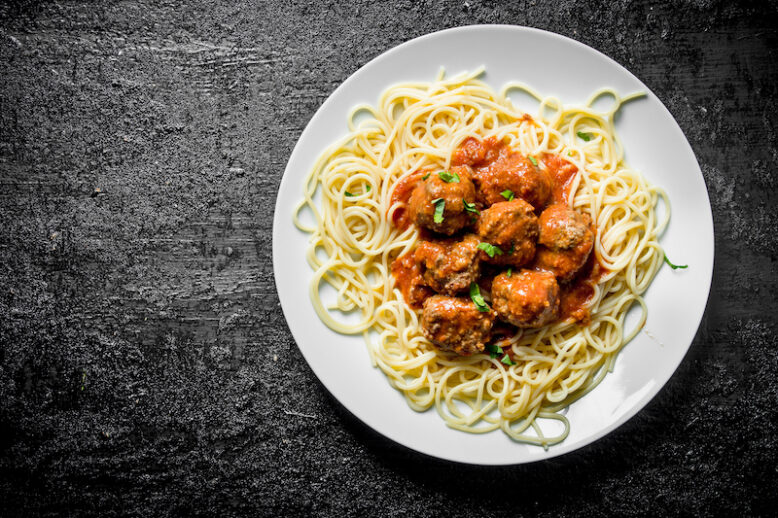
10. Pizza
Entered English in the early 19th century but only became popular when Italians began immigrating to the United States and Canada.
English meaning: a dish of Italian origin consisting of flat dough, tomatoes and cheese as well as other ingredients
- Plural: pizzas
Italian meaning: identical to the English meaning; can also be an expression of boredom (Che pizza! = How dull!); a film canister
- Plural: pizze

11. Panini
Entered English in the mid 20th century.
English meaning: a toasted sandwich made with Italian bread
- Plural: paninis or panini
Italian meaning: the plural of panino, which means sandwich or bread roll
- Singular: panino

12. Pepperoni
Entered English in the early 20th century.
English meaning: a sausage seasoned with pepper; the pepperoni pizza is the classic American pizza
- Plural: pepperonis
Italian meaning: peperoni (spelled with one p) is the plural of peperone which means pepper (referring to the fruit of the capsicum plant). What we call “pepperoni” is actually called salame piccante in Italian.
- Singular: peperone

13. Lasagna
English meaning: pasta in the form of sheets; an Italian dish consisting of lasagna noodles, cheese, meat/vegetables; may also be spelled lasagne when referring to the dish
- Plural: lasagnes
Italian meaning: identical to the English meaning but lasagna (singular) refers to the noodles whereas lasagne (plural) refers to the dish
- Plural: lasagne
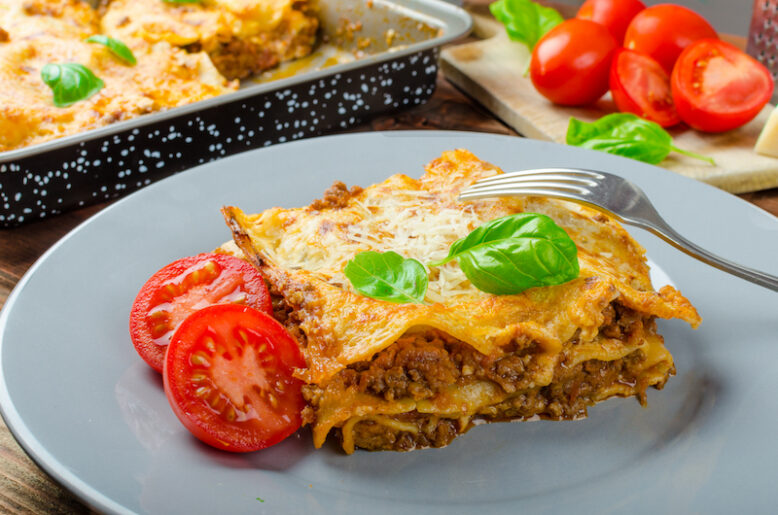
14. Pasta
Entered English in the late 19th century.
English meaning: a dish from Italy consisting of dough made from durum wheat and water, which is stamped into various shapes and cooked in boiling water.
- Plural: pastas
Italian meaning: in addition to the English meaning, it can also refer to dough, paste or pastry. Figuratively it can mean temperament or character.
- Plural: paste

15. Gelato
English meaning: an Italian style ice cream
- Plural: gelatos
Italian meaning: ice cream; literally it means chilled
- Plural: gelati

16. Broccoli
Entered English in the mid 17th century.
English meaning: a variety of cabbage with heads of green or purplish flower buds
- Plural: broccoli (mass noun)
Italian meaning: the plural of broccolo; same meaning as the English
- Singular: broccolo

17. Scampi
English meaning: Norway lobsters that have been prepared and cooked
- Plural: scampi
Italian meaning: the plural of scampo; same meaning as the English
- Singular: scampo
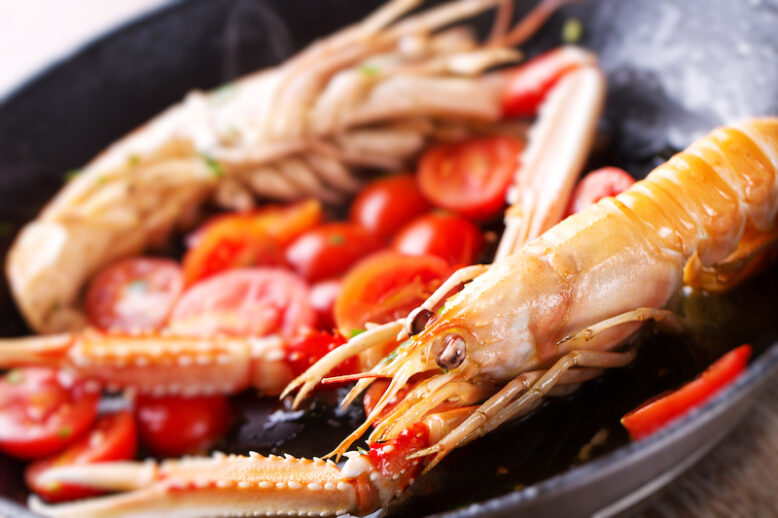
18. Diva
Entered English in the late 19th century.
English meaning: a famous female opera or pop singer; a temperamental person (usually a woman) who is difficult to please
- Plural: divas
Italian meaning: the feminine singular of divo meaning celebrity; diva can also refer to a temperamental woman just as in English
- Masculine singular: divo | Masculine plural: divi | Feminine plural: dive

19. Ballerina
Entered English in the late 18th century.
English meaning: a female ballet dancer; also used to describe ballet flats (type of shoe)
- Plural: ballerinas
Italian meaning: feminine of ballerino which means dancer, comes from the verb ballare (to dance); a kind of shoe
- Masculine singular: ballerino | Plural: ballerini | Feminine plural: ballerine

20. Duo
Entered English in the late 16th century as a musical term.
English meaning: a duet in music; a pair of people or things in music or entertainment
- Plural: duos
Italian meaning: a pair of performers in music or entertainment
- Plural: duo

21. Soprano
Entered English in the mid 18th century.
English meaning: the highest singing voice; a soprano singer; also used to describe instruments with a high pitch
- Plural: sopranos
Italian meaning: identical to the English meaning; can also be used in geography to mean upper in reference to a place
- Plural: soprani

22. Terracotta
Entered English in the early 18th century.
English meaning: a type of fired clay that is brownish-red in colour; a colour; can also be spelled terra-cotta
- Plural: terracotta
Italian meaning: can be used to refer to the fired clay or an artefact made with the clay
- Plural: terracotte

23. Motto
Entered English in the late 16th century.
English meaning: a phrase that encapsulates the beliefs or ideals of an individual, family or institution; a recurring phrase with a symbolic significance in music
- Plural: mottos or mottoes
Italian meaning: identical to the English meaning; can also mean quip or remark and in very rare literary cases, word
- Plural: motti

24. Stanza
Entered English in the late 16th century.
English meaning: a recurring verse in a poem
- Plural: stanzas
Italian meaning: a recurring verse in a poem; a room in a building
- Plural: stanze

25. Extravaganza
Entered English in the mid 18th century in reference to extravagant language or behaviour.
English meaning: an elaborate entertainment or production
- Plural: extravaganzas
Italian meaning: spelled stravaganza; bizzare, overindulgent or eccentric behaviour
- Plural: stravaganze

26. Ciabatta
English meaning: a flat Italian bread with a floury crust
- Plural: ciabattas
Italian meaning: identical to the English meaning; also means slipper (footwear), power strip, multi-plug adapter and wreck
- Plural: ciabatte
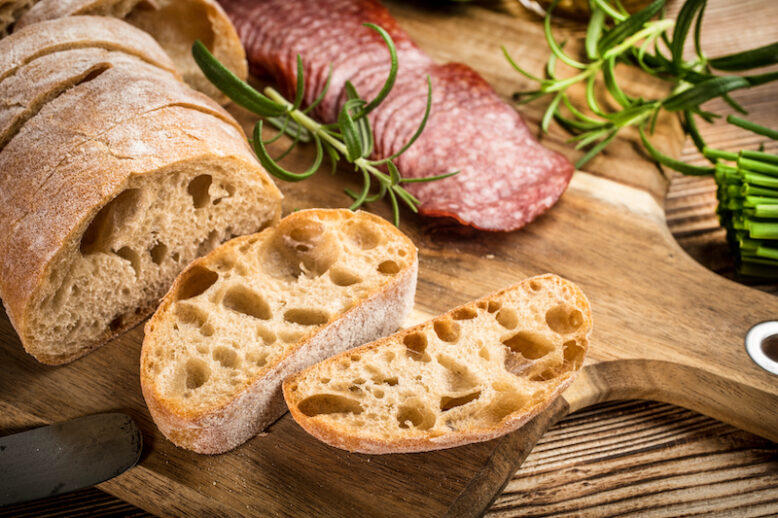
27. Minestrone
English meaning: a soup containing vegetables and pasta
- Plural: none
Italian meaning: identical meaning to the English; can also mean hodgepodge, mishmash or melting pot.
- Plural: minestroni
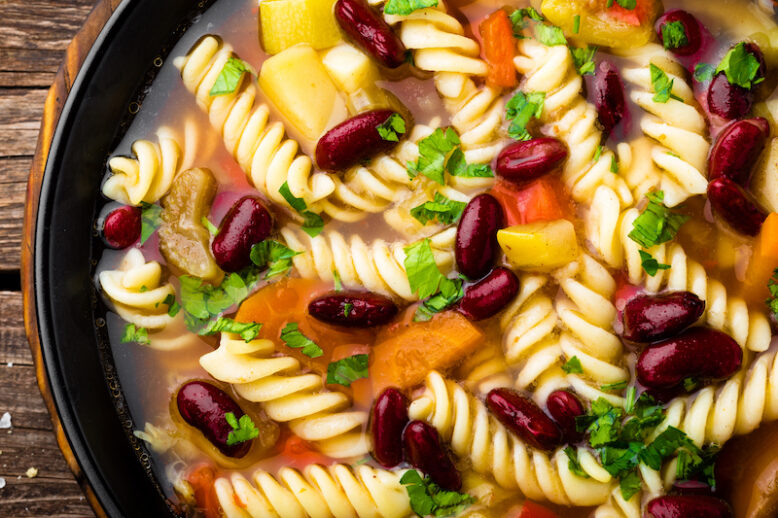
28. Mozzarella
English meaning: a white Italian cheese made from buffalo or cow’s milk, often used as a topping on pizzas
- Plural: mozzarella (mass noun)
Italian meaning: identical to the English meaning; can also mean a very pale person or a couch potato
- Plural: mozzarelle
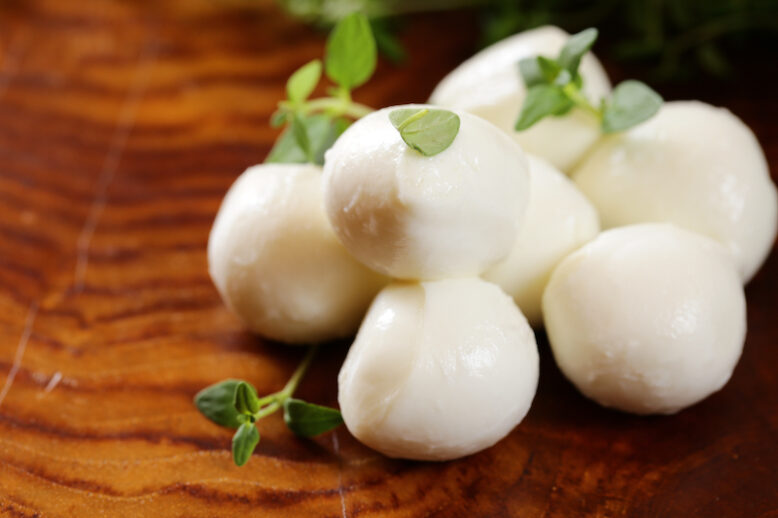
29. Pistachio
The late middle English pistace was superseded by the Italian pistaccio (now pistacchio) in the 16th century.
English meaning: an edible green seed; also the tree that produces the seeds
- Plural: pistachios
Italian meaning: identical to the English meaning; spelled pistacchio
- Plural: pistacchi

30. Magenta
Entered English in the mid 19th century.
English meaning: a light mauvish-crimson colour; a reddish dye; one of the primary subtractive colours
- Plural: none
Italian meaning: identical to the English meaning; named after the town Magenta in the north of Italy where a battle was fought shortly after red dye was discovered.
- Plural: none

31. Zucchini
English meaning: another word for courgette, the immature fruit of a vegetable marrow
- Plural: zucchinis or zucchini
Italian meaning: zucchine with an e is the plural of zucchina which is the diminutive of zucca (squash or pumpkin); refers to the same fruit as the English. Note that in certain dialects and regions, Italians use the masculine version, zucchino and zucchini which often refers to the plant that produces the vegetable.
- Singular: zucchina

32. Stiletto
Entered English in the early 17th century.
English meaning: a woman’s shoe with a thin high heel; a short dagger with a tapering blade
- Plural: stilettos
Italian meaning: only refers to the dagger; stiletto shoes are tacchi a spillo in Italian
- Plural: stiletti

33. Casino
Entered English in the mid 18th century
English meaning: a building where gambling games are played
- Plural: casinos
Italian meaning: can be a brothel or a term to describe a mess or chaos; also translates as racket or row; casinò with an accent on the o describes a gambling location
- Plural: casini (casinò remains the same)

34. Mafia
English meaning: an organised international body of criminals based in Italy and the US; any organised group that acts like the Mafia
- Plural: mafia
Italian meaning: identical to the English meaning
- Plural: mafie

35. Riviera
Entered English in the mid 18th century.
English meaning: a coastal region with a subtropical climate and vegetation such as the French Riviera
- Plural: rivieras
Italian meaning: literally means coast, coastline or shore
- Plural: riviere

36. Ghetto
Entered English in the early 17th century.
English meaning: a part of the city occupied by minority groups, historically used in reference to the Jewish population; an isolated or segregated group or area
- Plural: ghettos or ghettoes
Italian meaning: identical to the English meaning
- Plural: ghetti

37. Propaganda
English meaning: misleading or biased information used to promote a point of view or political cause; a committee of Roman Catholic cardinals responsible for foreign missions
- Plural: propaganda (mass noun)
Italian meaning: identical to the English meaning
- Plural: propagande

38. Paparazzi
Entered English in the 1960s from the film La Dolce Vita.
English meaning: a group of freelance photographers who pursue celebrities to photograph them
- Singular: paparazzo (not as commonly used as paparazzi)
Italian meaning: identical to the English meaning
- Singular: paparazzo

39. Malaria
Entered English in the mid 18th century.
English meaning: a fever caused by a parasite that invades the red blood cells, transmitted by female mosquitoes and common in tropical regions
- Plural: none
Italian meaning: Identical to the English meaning. Literally translates to bad air (mal and aria)
- Plural: malarie

40. Graffiti
Entered English in the mid 19th century.
English meaning: a writing or drawing scratched or sprayed on to a public surface such as a wall
- Plural: graffiti
Italian meaning: plural of graffito which means a piece of graffiti; also used in archaeology to refer to prehistoric art; the past participle of the verb graffiare (to scratch)
- Singular: graffito

41. Tarantula
Entered English in the 16th century.
English meaning: a large hairy spider found in tropical and subtropical America
- Plural: tarantulas
Italian meaning: spelled tarantola in Italian; identical to the English meaning. It gets its name from the seaport Taranto, although no spider species of the family Theraphosidae inhabit the area.
- Plural: tarantole

42. Bruschetta
English meaning: toasted Italian bread with olive oil, garlic and tomatoes
- Plural: bruschettas
Italian meaning: identical to the English meaning; can also refer to the children’s game drawing straws
- Plural: bruschette

43. Confetti
Entered English in the early 19th century.
English meaning: small pieces of coloured paper thrown during a celebration
- Plural: none
Italian meaning: plural of confetto which means a sugared almond sweet or pill; confetti are called coriandoli in Italian
- Singular: confetto

44. Tombola
Entered English in the late 19th century from French or Italian.
English meaning: a game in which you draw tickets out of a revolving drum and win prizes
- Plural: tombolas
Italian meaning: can refer to the game or the revolving drum itself
- Plural: tombole

45. Cappuccino
From the Italian Capuchin because its colour resembles that of a Capuchin’s garment.
English meaning: a type of frothy coffee made with espresso and milk
- Plural: cappuccinos
Italian meaning: identical to the English meaning
- Plural: cappuccini

46. Macaroni
Entered English in the late 17th century.
English meaning: a type of pasta in the shape of narrow tubes; the pasta dish
- Plural: macaronies
Italian meaning: spelled maccheroni; the plural of maccherone meaning the type of pasta
- Singular: maccherone
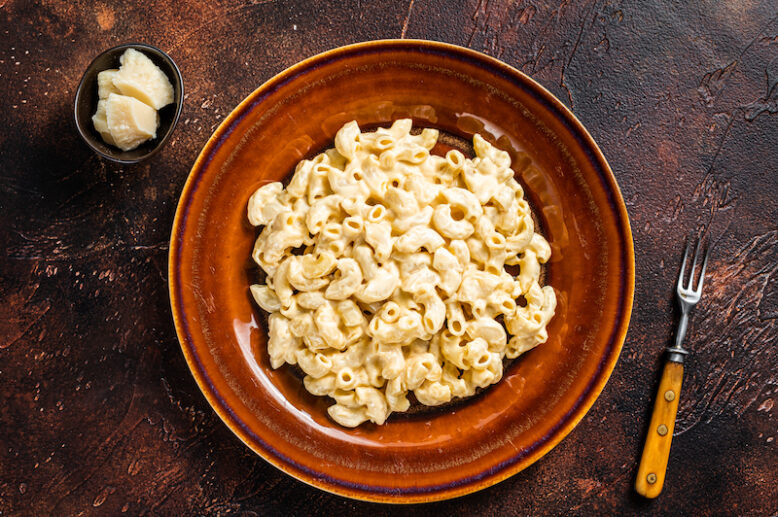
47. Gonzo
Entered English in the 1970s from the Italian gonzo or the Spanish ganso.
English meaning: an exaggerated style of journalism; bizarre or crazy; a popular character in the Muppets
- Plural: gonzos
Italian meaning: a fool, idiot or sucker
- Plural: gonzi | Feminine: gonza | Feminine plural: gonze
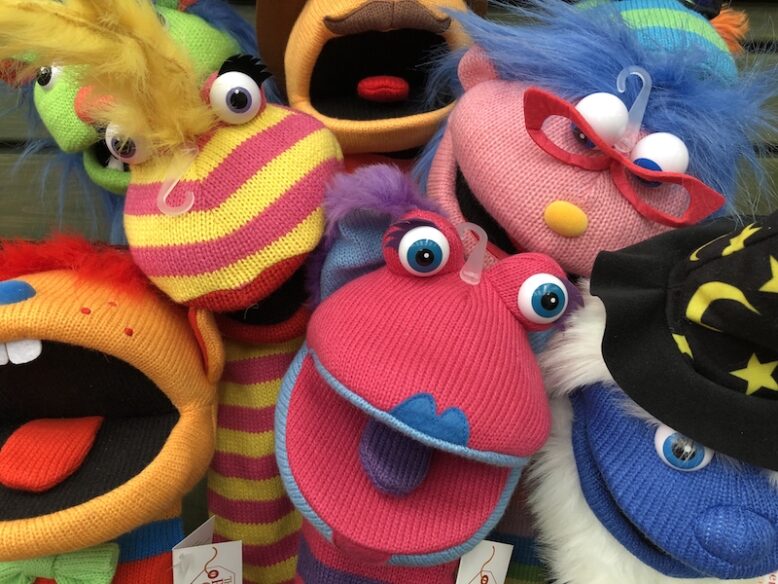
48. Biscotti
English meaning: small rectangular biscuits containing nuts
- Plural: biscottis
Italian meaning: plural of biscotto meaning biscuit or cookie; also refers to twice baked bread
- Singular: biscotto

49. Piccolo
Entered English in the mid 19th century.
English meaning: a small flute sounding an octave higher than an ordinary flute
- Plural: piccolos
Italian meaning: means small or tiny; a nickname for a baby or small child; the piccolo flute is called an ottavino in Italian
- Plural: piccoli | Feminine: piccola | Feminine plural: piccole

50. Vendetta
Entered English in the mid 19th century.
English meaning: when the family of a murdered person seeks revenge on the murderer and his/her family; a prolonged quarrel or campaign against someone
- Plural: vendettas
Italian meaning: can mean either revenge in any sense of the word or punishment
- Plural: vendette

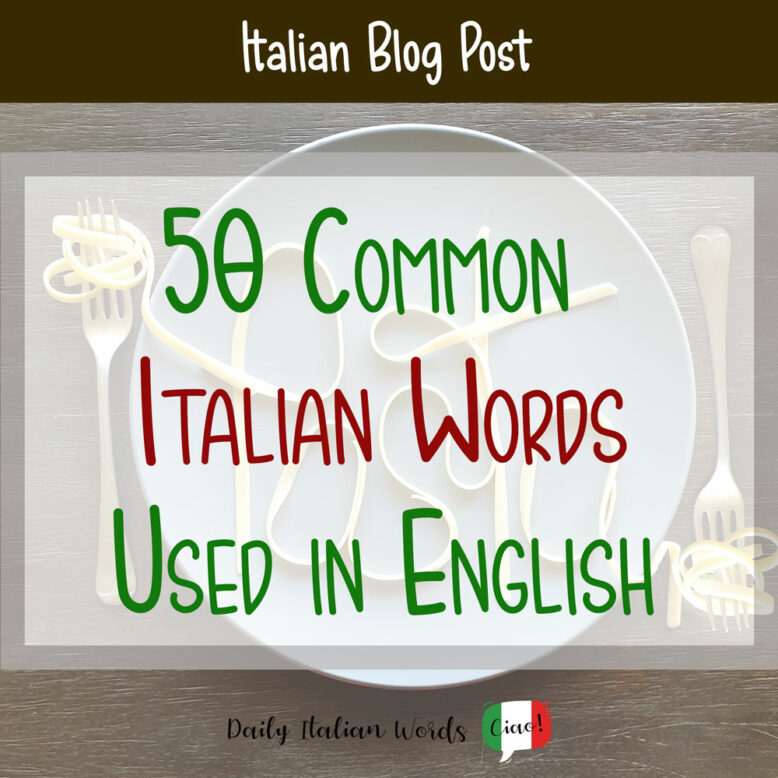
Heather Broster is a graduate with honours in linguistics from the University of Western Ontario. She is an aspiring polyglot, proficient in English and Italian, as well as Japanese, Welsh, and French to varying degrees of fluency. Originally from Toronto, Heather has resided in various countries, notably Italy for a period of six years. Her primary focus lies in the fields of language acquisition, education, and bilingual instruction.


